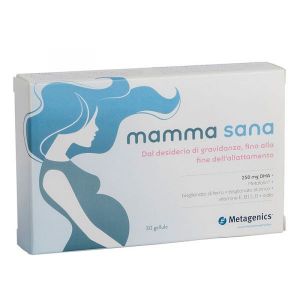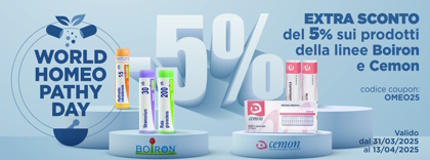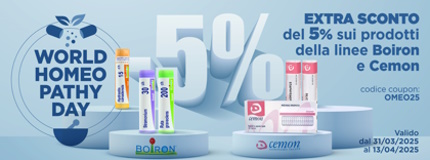Ship in Europe, Find out rates!
Metagenics Mamma Sana 30 Capsules

- box Delivery in Italy in 24/48 and free returns
- star3.000+ positive reviews
- dropboxOver 60,000 products in the catalog
MammaSana is a multivitamin and multimineral food supplement with DHA suitable for women of childbearing age, pregnancy and breastfeeding.
Thanks to its balanced composition MammaSana provides the most important nutrients for the health of the mother and the unborn child.
During pregnancy, the need for many vitamins and minerals increases; for this it is necessary to pay more attention to the diet and possibly integrate with quality products.
Sub-optimal levels of vitamins and minerals, even much higher than those responsible for the classic deficiency syndromes (scurvy, pellagra, xerophthalmia) would be included in the risk factors for some chronic diseases and would increase complications during pregnancy and childbirth.
The Ministry of Health has identified the nutrients for which there is a greater risk of deficiency during pregnancy and breastfeeding. They are:
Vitamin B9
Iron
Zinc and Copper
Soccer
Vitamin B12
Polyunsaturated fatty acids of the n-3 series
Iodine
Mammasana provides nutrients in the most bioavailable and safe form:
Vitamin B9 is considered one of the nutrients most at risk of deficiency during pregnancy and even before, during conception. An insufficient dietary intake can cause malformations in the unborn child such as neural tube disorders or spina bifida. Reference intake levels in pregnant women are higher than in other adults due to the increased demand due to fetal development.
Folic acid is the source of vitamin B9 usually used as a supplement, but this inactive pro-vitamin must be transformed into its active form through numerous steps that consume energy and are deficient in 1 out of 5 Italians. at the last step of activation of pro-vitamin into methylpholine (active form) it works only at 35%. This genetic polymorphism (5MTHFR) can make normal dietary intake of folate insufficient. For this reason, Metagenics has included Metilfolin ™ (methylpholine), the biologically active form of vitamin B9, in the MammaSana formula, capable of exercising its biological role regardless of genetic deficiencies.
Zinc and bisglycinate iron
Zinc contributes to women's fertility and normal reproductive function, helps protect cells from oxidative stress and plays a role in cell division.
The EFSA European food safety body, in a 2008 opinion confirmed that bisglycinates are a safe and bioavailable form for the administration of micronutrients such as iron and zinc.
In these forms the mineral is bound to two amino acids to form an electrically neutral molecule and therefore not able to irritate the gastric mucosa causing the frequent unwanted effects of other forms of salification.
Furthermore, bisglycinates are absorbed in a major part of the intestine with the transport molecules of amino acids. The bisglycinate iron being in bivalent form is immediately absorbable and does not require the reducing action of vitamin C.
“The guidelines recommend an intake of 30 mg of iron during gestation and the increased intake should be recommended at the first gynecological visit after conception. In practice, taking into account that iron deficiency can have serious consequences and that, conversely, a careful integration is practically risk-free, a supplementation that favors the deposit of iron is normally recommended, useful both for the pregnancy period and for the post-pregnancy period. partum. Iron supplementation can be particularly useful in cases of close pregnancies "
Polyunsaturated fatty acids of the n-3 series (Ω 3): DHA
During pregnancy, a diet that provides a source of polyunsaturated fatty acids of the n-3 series is suggested. The foods that contain them are mainly fatty fish such as sardines, herring and mackerel. A healthy and varied diet during pregnancy should include at least 2 portions of fish a week, taking care to avoid products contaminated with heavy metals and pesticides.
In light of the scientific evidence according to which DHA is involved in cerebral and ocular maturation, the Italian Ministry of Health suggests an integration of DHA alone in pregnancy at a concentration of 250mg / day; is the quantity present in a MammaSana gel.
Greater attention must be paid to vegetarians or smokers. The former may not introduce sufficient quantities of omega 3 fatty acids into the diet, the latter must counterbalance the action of smoking which reduces plasma levels of DHA
Iodine
An insufficient intake of iodine can cause problems in all stages of life and in particular during pregnancy, breastfeeding and childhood.
A deficiency of iodine during the development of the fetus and newborn leads to irreversible damage to the brain and central nervous system and, consequently, to permanent mental retardation. Even mild iodine deficiencies, such as those commonly found in our country, still lead to intellectual deficits. Supplementation with iodine is safe at the recommended and physiological dosages present in a MammaSana gel and is generally free of unwanted effects.
Vitamin B12 in the form of methylcobalamin
Vitamin B12 is essential for many biological processes such as cell division, the formation of red blood cells and fundamental metabolic processes such as the synthesis of neurotransmitters. For this reason, this nutrient must absolutely not be missing during a delicate phase such as pregnancy and breastfeeding. The source of vitamin B12 commonly used in supplements is cyanocobalamin, a substance not normally present in our body. This substance must be transformed into the active and physiological form of vitamin B12: methylcobalamin.
Metagenics has chosen to include in the Mammasana formula the active and more bioavailable form of vitamin b12, methylcobalamin which among other things is also less susceptible to being degraded by light and heat.
Vitamin D in pregnancy
Vitamin D supplementation in pregnant women and infants increases the percentage of children who reach the levels of vitamin D recommended by the Institute of Medicine (IOM) (13). Indeed, many studies have clearly shown that vitamin deficiency D in pregnancy has negative effects on both mother and infant and in pregnancy prevention of vitamin D deficiency should be done in the same way as in non-pregnant women (14). The most recent guidelines recommend the administration of 600 IU / day of vitamin D (14,15)
HOW TO USE
One jelly per day or as recommended
PRECAUTIONS
Food supplements are not intended as a substitute for a healthy and varied diet.

